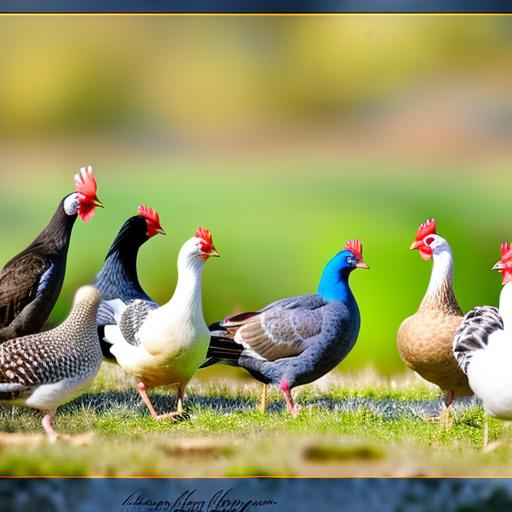Chicken and goose flocks are both popular choices for backyard poultry enthusiasts. Chickens are known for their egg-laying abilities and friendly personalities, while geese are valued for their watchful nature and ability to act as guardians. Understanding the dynamics of these two types of flocks is important for those considering coexisting chickens and geese in their flock.
Chickens are social animals that thrive in groups. They have a hierarchical structure, with one dominant rooster leading the flock. Chickens are known for their foraging abilities and can help control pests in the garden. Geese, on the other hand, are highly territorial and protective. They form strong bonds with their flock members and are known to be excellent guard animals. Geese are also grazers and can help keep grass and weeds under control.
Key Takeaways
- Chickens and geese can coexist in a flock and provide benefits to each other.
- Before introducing geese to your chicken flock, consider factors such as space, temperament, and breed compatibility.
- Preparing the coop and run for both chickens and geese is important for their safety and comfort.
- Feeding and nutrition requirements differ between chickens and geese, so it’s important to provide appropriate food and supplements.
- Socialization and integration strategies can help chickens and geese get along and establish a hierarchy.
The Benefits of Coexisting Chickens and Geese in Your Flock
There are several benefits to coexisting chickens and geese in your flock. One of the main benefits is increased protection against predators. Geese are known to be excellent guard animals and will sound the alarm if they sense danger. Their loud honking can deter predators and alert the rest of the flock to potential threats.
Another benefit is improved foraging and grazing. Chickens and geese have different feeding habits, which can complement each other. Chickens scratch at the ground, uncovering insects and other tasty treats, while geese graze on grass and weeds. By allowing them to coexist, you can maximize their foraging abilities and ensure that your flock has access to a variety of food sources.
Coexisting chickens and geese also provides enhanced socialization and entertainment for both species. Chickens are social animals that enjoy the company of others, while geese form strong bonds with their flock members. By allowing them to interact, you can provide a more enriching environment for both species. Watching their interactions can also be highly entertaining for poultry enthusiasts.
Factors to Consider Before Introducing Geese to Your Chicken Flock
Before introducing geese to your chicken flock, there are several factors to consider. One of the most important factors is space requirements. Geese require more space than chickens, both in the coop and in the run. They need room to spread their wings and graze, so make sure you have enough space to accommodate them.
Temperament and behavior differences between chickens and geese should also be taken into account. Chickens are generally docile and can be easily intimidated by more assertive geese. It’s important to choose geese that have a calm temperament and are not overly aggressive towards other birds. Additionally, consider the age and size of your existing flock members when introducing geese, as smaller or younger birds may be more vulnerable to aggression.
Compatibility with existing flock members is another important factor to consider. Some chickens may not tolerate the presence of geese and may become stressed or aggressive. It’s important to monitor their interactions closely and be prepared to separate any birds that are not getting along. Introducing geese gradually and providing plenty of space for all birds can help minimize conflicts.
Preparing Your Coop and Run for Chickens and Geese
| Aspect | Metric |
|---|---|
| Coop Size | Minimum of 4 square feet per chicken |
| Roosting Bars | 1.5 inches wide and 6-10 inches off the ground |
| Nesting Boxes | 1 box per 3-4 hens, 12x12x12 inches in size |
| Run Size | Minimum of 10 square feet per chicken |
| Run Cover | Provide shade and protection from predators |
| Feed and Water | Provide fresh water and appropriate feed for age and breed |
| Cleaning | Clean coop and run regularly to prevent disease and pests |
| Security | Secure coop and run from predators such as raccoons and foxes |
When coexisting chickens and geese, it’s important to ensure that your coop and run are adequately prepared to accommodate both species. The coop should have enough space for all birds to roost comfortably at night. Provide separate roosting bars for chickens and geese, as they have different preferences for perching.
Separation options should also be considered, especially if conflicts arise between chickens and geese. This can include using wire mesh or fencing to create separate areas within the run, allowing each species to have their own space. Providing multiple feeding and watering stations can also help prevent competition for resources.
Nesting and roosting arrangements should be suitable for both chickens and geese. Chickens prefer nesting boxes that are enclosed and provide privacy, while geese prefer open nests on the ground. Provide nesting boxes for chickens and create suitable nesting areas for geese, such as a bed of straw or grass.
Feeding and Nutrition Requirements for Chickens and Geese
Chickens and geese have different dietary needs, so it’s important to consider their feeding and nutrition requirements when coexisting them in a flock. Chickens require a balanced diet that includes a mix of grains, protein, vitamins, and minerals. They also need access to grit to aid in digestion.
Geese have a higher need for grass and greens in their diet. They are grazers and require access to fresh grass or pasture. Supplement their diet with poultry feed that is specifically formulated for geese, as it will provide the necessary nutrients they need.
Feeding strategies for mixed flocks can include providing separate feeding stations for chickens and geese to prevent competition. This can include using different types of feeders or feeding at different times of the day. It’s also important to monitor the intake of each species to ensure they are receiving the appropriate amount of food.
Supplemental feeding options can be provided to both chickens and geese to enhance their diet. This can include offering treats such as mealworms or kitchen scraps, but it’s important to do so in moderation. Too many treats can lead to nutritional imbalances or obesity.
Socialization and Integration Strategies for Chickens and Geese

When introducing geese to your chicken flock, it’s important to use gradual introduction techniques to minimize stress and aggression. Start by allowing the birds to see each other through a wire mesh or fence, so they can become familiar with each other’s presence without direct contact. After a few days, allow supervised interactions in a neutral territory, such as a separate enclosure or a large open space.
Monitor flock dynamics closely during the integration process. Look for signs of aggression or bullying, such as pecking or chasing. If any bird is being excessively aggressive, it may be necessary to separate them temporarily until they can coexist peacefully.
Addressing aggression and bullying is important to maintain a harmonious flock. Provide plenty of hiding spots and perches for chickens to escape from aggressive geese. If necessary, consider adding more than one goose to the flock to help distribute aggression and prevent one bird from becoming a target.
Common Challenges and Issues When Coexisting Chickens and Geese
Coexisting chickens and geese can come with its own set of challenges and issues. One common challenge is competition for resources, such as food and water. Chickens are known to be opportunistic eaters and may try to steal food from geese. Providing multiple feeding and watering stations can help prevent this issue.
Health concerns can also arise when coexisting chickens and geese. Geese are more resistant to certain diseases than chickens, but they can still be carriers of pathogens that can affect chickens. It’s important to practice good biosecurity measures, such as regular cleaning and disinfection of the coop and run, to minimize the risk of disease transmission.
Flock hierarchy and dominance issues can also occur when coexisting chickens and geese. Chickens have a natural pecking order, with one dominant rooster leading the flock. Introducing geese to the flock can disrupt this hierarchy and lead to conflicts. It’s important to monitor flock dynamics closely and be prepared to intervene if necessary.
Health and Disease Management for Chickens and Geese
Maintaining the health of your mixed flock is crucial for their overall well-being. Preventative measures such as regular cleaning and disinfection of the coop and run can help minimize the risk of disease transmission. Provide clean bedding and nesting materials, and remove any feces or soiled bedding regularly.
Common illnesses in chickens include respiratory infections, parasites, and egg-related issues. Geese are more resistant to certain diseases, but they can still be affected by parasites and respiratory infections. It’s important to monitor the health of all birds in the flock and seek veterinary care if any signs of illness are observed.
Biosecurity practices should be implemented to prevent the introduction and spread of diseases. This includes limiting contact with other poultry or wild birds, practicing good hygiene when handling birds or their equipment, and quarantining new birds before introducing them to the flock.
Breeding and Reproduction Considerations for Mixed Flocks
Breeding and reproduction in mixed flocks can present some unique considerations. Chickens and geese have different breeding behaviors and mating rituals. Chickens typically mate in a quick and discreet manner, while geese engage in elaborate courtship displays.
Hybrid offspring are a possibility when coexisting chickens and geese. However, it’s important to note that hybrid offspring may not be as fertile or productive as purebred birds. If you are interested in breeding hybrid offspring, it’s important to carefully select compatible breeds and monitor the breeding process closely.
Managing brooding and incubation can also be a challenge in mixed flocks. Chickens are known for their brooding instincts and will often sit on eggs to hatch them. Geese, on the other hand, do not have the same brooding instincts and may not be as successful at hatching eggs. Consider using an incubator or providing a separate brooding area for geese if you are interested in hatching their eggs.
The Rewards of Successful Chicken and Goose Coexistence
Coexisting chickens and geese in your flock can provide a range of benefits, including increased protection against predators, improved foraging abilities, and enhanced socialization and entertainment. However, it’s important to consider factors such as space requirements, temperament differences, and compatibility with existing flock members before introducing geese to your chicken flock.
Preparing your coop and run to accommodate both chickens and geese is crucial for their well-being. Providing adequate space and shelter, as well as separation options, can help prevent conflicts and ensure that all birds have access to the resources they need. Pay attention to nesting and roosting arrangements to meet the preferences of both species.
Feeding and nutrition requirements should be considered when coexisting chickens and geese. Provide a balanced diet for chickens and supplement with grass and greens for geese. Use feeding strategies to prevent competition for resources and monitor the intake of each species.
Socialization and integration strategies should be used when introducing geese to your chicken flock. Gradual introduction techniques and close monitoring of flock dynamics can help minimize aggression and bullying. Address any issues promptly to maintain a harmonious flock.
Common challenges and issues that may arise when coexisting chickens and geese include competition for resources, health concerns, and flock hierarchy issues. Implementing good biosecurity practices, practicing regular cleaning and disinfection, and monitoring the health of all birds can help prevent and manage these challenges.
Breeding and reproduction considerations should also be taken into account when coexisting chickens and geese. Understanding the differences in breeding behaviors, the possibility of hybrid offspring, and managing brooding and incubation can help ensure successful reproduction in mixed flocks.
In conclusion, coexisting chickens and geese in your flock can provide a rewarding experience for poultry enthusiasts. By understanding their dynamics, preparing your coop and run appropriately, addressing feeding and nutrition requirements, implementing socialization strategies, managing common challenges, maintaining their health, and considering breeding considerations, you can create a harmonious environment where both species can thrive.
If you’re considering keeping geese with your chickens, you may be wondering how compatible these two species are. While geese and chickens can coexist in the same space, there are some important factors to consider. In a related article on Poultry Wizard, you can learn more about the dynamics of keeping geese with chickens and how to ensure a harmonious living environment for both. Check out the article here for valuable insights and tips on successfully integrating geese into your chicken coop.
FAQs
What are the differences between geese and chickens?
Geese are larger and more aggressive than chickens. They are also more territorial and protective of their flock.
Can geese and chickens live together?
Yes, geese and chickens can live together, but it is important to introduce them slowly and monitor their interactions. Geese may bully or attack chickens, especially during mating season.
What are the benefits of keeping geese and chickens together?
Geese and chickens can provide mutual benefits, such as pest control and fertilization. Geese can also act as protectors for the flock, alerting them to potential predators.
What are the potential drawbacks of keeping geese and chickens together?
Geese can be aggressive towards chickens, and may harm or kill them. They also require more space and water than chickens, and can be noisy.
How should geese and chickens be introduced?
Geese and chickens should be introduced slowly, with a physical barrier between them at first. Gradually allow them to interact under supervision, and separate them if any aggression occurs.
What should be considered when building a coop for geese and chickens?
The coop should be large enough to accommodate both species, with separate areas for nesting and roosting. It should also have adequate ventilation and access to water for the geese.
Meet Walter, the feathered-friend fanatic of Florida! Nestled in the sunshine state, Walter struts through life with his feathered companions, clucking his way to happiness. With a coop that’s fancier than a five-star hotel, he’s the Don Juan of the chicken world. When he’s not teaching his hens to do the cha-cha, you’ll find him in a heated debate with his prized rooster, Sir Clucks-a-Lot. Walter’s poultry passion is no yolk; he’s the sunny-side-up guy you never knew you needed in your flock of friends!







